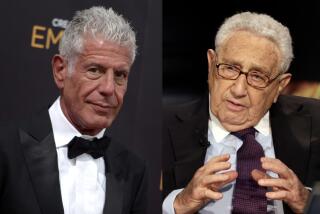Guy J. Pauker, 85; Rand Analyst, U.S. Consultant on Southeast Asia
- Share via
Guy J. Pauker, an expert on Southeast Asia who was a consultant to the National Security Council and other federal agencies on Vietnam, Indonesia and the Philippines from the 1960s to the 1980s, has died. He was 85.
Pauker died Sept. 4 in Los Angeles after a long illness.
For the record:
12:00 a.m. Nov. 6, 2002 For The Record
Los Angeles Times Wednesday November 06, 2002 Home Edition Main News Part A Page 2 National Desk 16 inches; 589 words Type of Material: Correction
Guy J. Pauker -- An obituary of Guy J. Pauker in the Sept. 16 California section omitted some survivors. Pauker, an expert on Southeast Asia, is also survived by another son, Randolph Guy Pauker of the San Francisco Bay Area, and one granddaughter.
Statesmen, generals and journalists queried and quoted Pauker for decades on knotty international problems ranging from Indonesian stability after Sukarno and the political value of discovering oil and gas in the Philippines to the wisdom of pursuing Vietnam War peace talks and whether the U.S. should become the world’s police force.
In 1977, before uprisings in Iran, Iraq, Bosnia, Africa and Afghanistan, Pauker prophetically outlined, in a Rand report for the Air Force, “a breakdown of global order as a result of sharpening confrontation between the Third World and the industrial democracies.”
In that report, the veteran Cold War analyst cautioned the military leaders, to whom the Vietnam debacle was still fresh:
“In deciding to use military force for the protection of limited national interest, a great power which is also a democracy has to be responsive to a wide range of considerations. Should the U.S. government be prepared to project its power into all parts of the world where Americans may wish to travel, trade, study or engage in any other normal and peaceful activity, in order to protect them? If not, where should one draw the line?”
In March 1971, Pauker was also the author of a Rand report sent to the Pentagon and circulated to top officials, including Henry A. Kissinger, then presidential advisor for national security affairs and coincidentally a Harvard classmate of Pauker’s. The report, kept secret for 18 months, spoke of the futility of the Paris peace talks as an effort to resolve the Vietnam War.
At the time, the Nixon administration advocated a twin approach--peace talks, coupled with “Vietnamization” or creating a South Vietnamese government strong enough to resist Communist pressure without direct U.S. military involvement.
The two avenues, Pauker said, “cannot be pursued simultaneously, with equal chance of success.”
A negotiated settlement was impossible, he said, because “neither side is willing to share power with the other, nor can one visualize a reasonable division of power between these two mortal enemies.... [Any negotiated coalition government] would not last. No devilishly clever Communist schemes would be necessary to bring about its downfall.”
The author of more than 100 books and articles, Pauker was well-schooled in international politics.
Born in Bucharest, Romania, in 1916, he earned master’s, doctoral and law degrees from the University of Bucharest, and worked as an editorial writer and correspondent.
In the years after World War II, as Communists began their takeover, Pauker served as secretary general of the Romanian Institute for International Affairs. He also co-founded Friends of the U.S. in Bucharest and edited its “Russian-American Review” until Communists silenced the quarterly publication.
Because of the political conflict, Pauker left Romania for the U.S. in 1948, and earned a master’s degree and a doctorate in social science at Harvard, concentrating on Southeast Asia. Pauker taught briefly at Harvard and then, from 1956 to 1963, at UC Berkeley, where he became head of the Center for Southeast Asian Studies.
In 1960, he also began his work for Rand in Santa Monica. For more than two decades, he was a consultant to the National Security Council, the State Department, the Department of Defense, the U.S. Senate Committee on Foreign Relations, the House Committee on International Affairs and the National War College.
He flew to Washington frequently to testify at hearings and, long after his official retirement in 1982, journalists still sought his opinions.
As the Persian Gulf crisis built in 1990, for example, he predicted for The Times that the economic effects on Southeast Asia would range from a “disaster” in the energy-short Philippines to “Christmas” for Indonesia, Asia’s largest oil exporter.
When a potentially large oil field was discovered in the Philippines late that year, he told The Times:
“The whole stability of the government is threatened by the lack of oil. If they really have found big oil, this would be sensational and a blessing--the greatest thing that could ever happen to them.”
Pauker is survived by his wife of 42 years, Ewa; their son, Anthony; and one sister, Sylvia of Paris. A celebration of Pauker’s life is being planned for Saturday.
More to Read
Sign up for Essential California
The most important California stories and recommendations in your inbox every morning.
You may occasionally receive promotional content from the Los Angeles Times.













